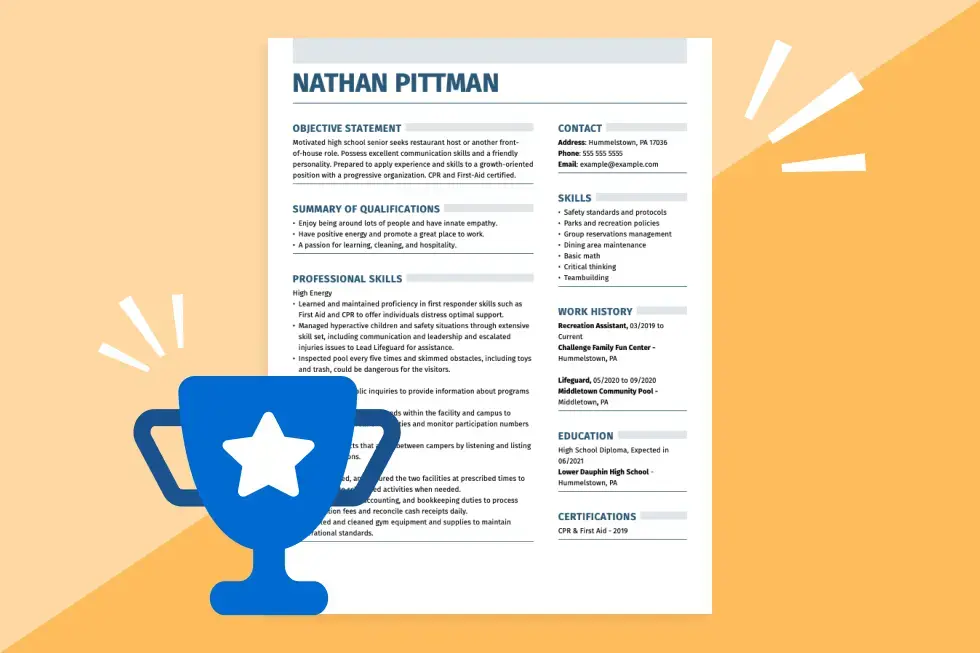How to List Awards on a Resume the Right Way Examples
Here, you’ll learn how to add awards to your resume. We cover the best types of awards to list and how to include them in different sections of your resume, including your work experience, education, professional summary and as a dedicated “Awards” section.
Why Include Awards on Your Resume?
Listing awards on your resume can instantly distinguish you from other job seekers, which can help you land a job.
Awards can provide prospective employers insight into the type of employee you’d be. If you’ve received any professional awards — especially, any industry-wide awards — include them on your resume.
Including awards on your resume is beneficial for these reasons:
- Confirms that others see your value and excellence.
- Shows you understand what it means to be high-performing.
- Demonstrates your passion and pride.
- Sets you above other candidates without such honors.
Awards versus achievements
Achievements are results you make happen like a boost in sales, efficiency or customer retention.
An award is formal recognition from others for your achievements. Awards could take the form of trophies, ceremonies or certificates.
Next, we’ll show you the best types of awards to include when writing a resume.
But if you’re ready to make a professional-quality resume now, you can complete your document in under 15 minutes using our Resume Builder!
It’s a tool that makes creating a resume easy because it walks you through the process step-by-step, like having an expert guide you! Best of all, you can customize its professionally designed resume templates by adding custom sections like “Awards and honors” or “Certifications.”
What Awards Should You Include on Your Resume?
Awards on your resume will help you as long as they’re recognitions that show your hard work, discipline, performance quality or uniqueness!
Some awards, however, should be skipped on your resume. Unprofessional honors like winning a hot dog eating contest or being voted “Biggest gossip” your senior year are better left unsaid to employers.
Here are the top types of awards to add to your resume:
Company top-performer awards
The best awards to put on a resume are those rewarding excellent work performance. Whether for sales or a consistent safety record, these awards show that you are an asset to any organization you work for and excel.
Examples of company awards for resume:
- Top performer awards, eg. ‘Top Grossing Clerk’
- Employee of the month or year
- Leadership awards
- Mentorship honors
- Peer awards
- KPI-related recognition
Community or industry awards
Any award showcasing your networking, participation, positive attitude or service to others will help your resume! Showcasing that you won an award in a professional association affiliated with your industry is also a huge plus.
Examples of community or industry awards:
- Industry association awards, e.g., “Florist of the Year”
- Awards for books or articles
- Honored in a list or roundup, e.g., “Best of …” or “40 under 40” lists
- Professional association awards, e.g., Webby Awards
- Community or civic honors
- Art or culture awards
Academic, educational and student awards
These are perfect awards to put in the education section of your resume, mainly if you’re new to the workforce or even when writing a college resume. However, if it’s been over five years since you graduated, avoid listing too many educational honors. Save that space instead to focus more on your work experience because employers care more about your work potential than academic performance.
Examples of education awards for resumes:
- Scholarships
- Dean’s list or honor roll
- Departmental awards
- Fellowships
- Research or project grants
- Honor societies, e.g., National Honor Society
- Research or project grants
- Latin honors, e.g., Magna cum Laude, Summa cum laude
Where to Include Awards on Your Resume
Most people tend to sprinkle awards throughout their resume, mentioning them in the section that is related to the recognition whether it was education or work.
If you have three or more awards to list, you could also feature them in a dedicated “Awards” section.
Dedicated awards resume section example:
Awards
- Three-time recipient of the “Saleshound of the Year” Award: ‘17, ‘19 and ‘22
- Named “Sales Leader of the Year,” ’22
- Earned “Rookie of the Year” as a junior sales member ‘15
Placement of the “Awards” section within your resume is flexible. People often place it toward the end of the resume. If you have significant awards you want to showcase, you could move it above or next to your work experience section.
Here are other resume sections in which you can add awards.
Work experience
Your work experience section is the natural place to connect a job you had with the honors you achieved in that role. Just use one of your work bullet points to mention the award.
Try to be detailed about the results you achieved that won you the award. To see how, check out some helpful resume examples.
Example of awards in the work experience section:
- Earned the 2021 Employee of the Year award after growing sales by 125% through market analysis.
- Set a company record for reducing my budget by 24% and received the Chairman’s Award.
- Earned company 2022 “Cold Call” Award by opening the most new accounts out of 15 sales reps on team.
Education section
The education section of the resume is where you should list notable awards or scholarships you received as a student. Keep in mind that employers are less concerned with your academic performance than your professional skills.
So, the longer it’s been since you graduated, the less detail you should include in this section!
Example of awards in education section:
Desert State University Tempe, AZ
Bachelor of Engineering in Civil Engineering
Honors: Summa cum laude, GPA: 3.9
Recipient of the full-ride Founders Scholarship
Summary section
Your resume’s professional summary is like its greatest hits section. Any award you feature here is going to get a lot of attention. So, reserve your top award for this section, especially if it sets you apart from the other candidates in your profession.
Example of awards in the summary section:
“User-focused graphic design professional with 6+ years of experience creating mobile and desktop sites that convert for businesses. My intuitive sense of UX and trust building through quality design principles earned me the 2021 “Best UX Concept” award for the site I designed for Innux Technologies.”
How to List Awards on Your Resume
When you mention an award, you’ll need to provide some basic information.
Here are the award basics to include:
- The name of the award
- Date or year received
- The reason for the award
- The organization or group that gave the award, e.g., your employer, the Chamber of Commerce or an industry association
Use action verbs when describing your achievements and awards because they will grab the reader’s attention better. For example, rather than just list the award, say something more action-oriented like “earned,” “won,” “honored” or “recognized.”
Quantify the recognition
Did you win an essay contest that 5,000+ people entered? That’s worth mentioning! It will better help the employer understand the stakes and scope of your award.
Even if you include the numbers that helped you earn the reward, it will help employers understand your ability.
How many people did you beat out to get the award? What was the award for? What did you win? For example, say you won out of a field of 200 applicants to receive a 30K scholarship — a recruiter or hiring manager would be impressed by this.
Key Takeaways:
- Cite the title of the award and the details of who gave it if it’s not apparent.
- Use action verbs like “Achieved, Honored, Earned, Recognized” when describing your award.
- Skip mentioning awards that have nothing to do with your work or present you in an unprofessional light.
- Make your award more meaningful by quantifying the accomplishments behind the prize.
Also, remember that you can also talk about awards you’ve received in your cover letter. It’s a space where you can tell a story about the achievements that led you to win an award.
To help you, our Cover Letter Generator takes the pain out of cover letter writing! It’s loaded with professionally designed cover letter templates and expert-written text phrases that can save you much time.
That way, you can focus on the message of your letter instead of the tedious formatting details!









